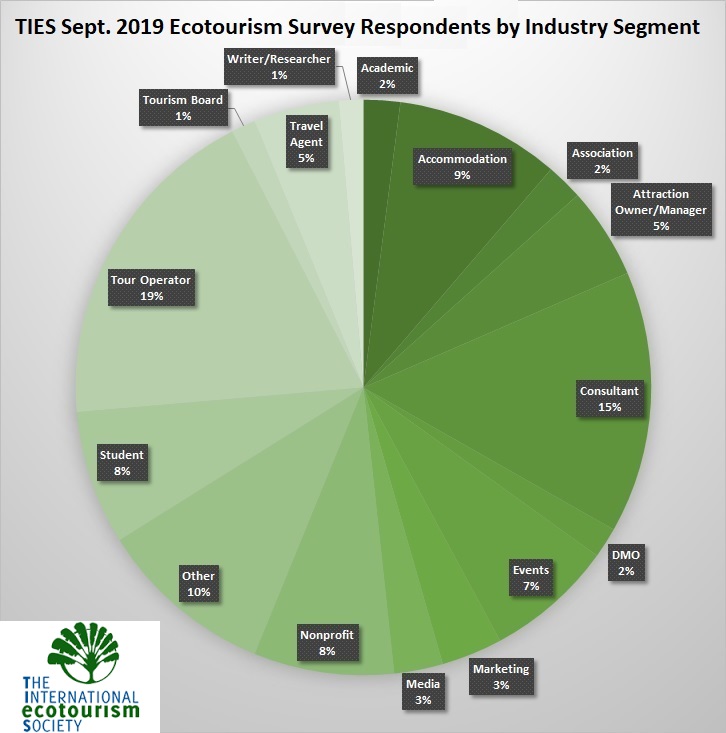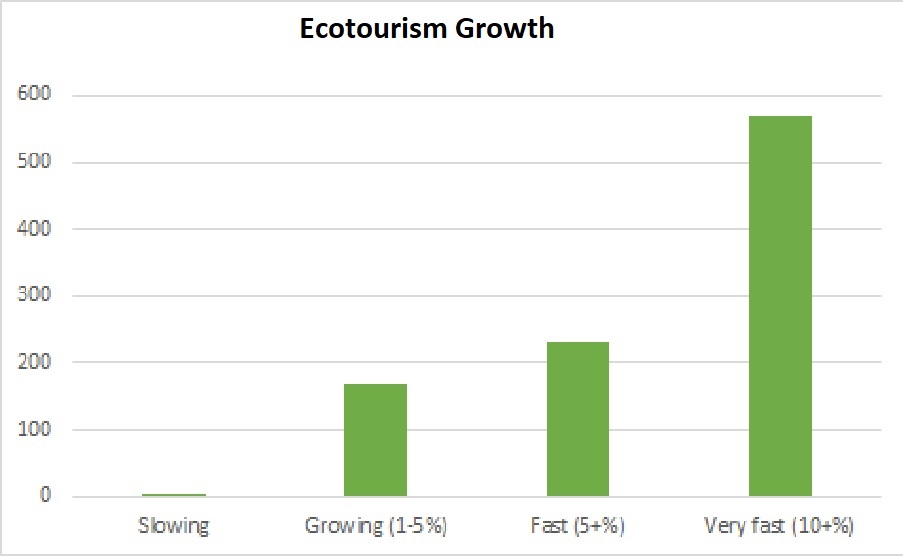In the last issue of our newsletter we asked members and friends in the tourism profession to take our survey to gauge how they see ecotourism today. We received 971 viable responses from 91 countries in every continent. We received the largest number of responses from the USA, but we were heartened to receive responses from Sudan, Palestinian territories, Israel, Venezuela, Bhutan, Montenegro, Bosnia and Herzegovina, Nepal, Cote D’Ivoire and Iran, along with 80 other nations.
Among the respondents, 90% of the respondents were able to classify their industry segments using the choices we provided, but we did get several suggestions to allow multiple industry segments. The chart below details respondent’s self-classification.

We knew we’d have many tour operators and consultants responding, but we didn’t anticipate as few academics as we got, seeing as they make up a larger percentage of our membership than they are represented by this response. Nevertheless, we have an excellent response group and we learned some very important data.
First, we learned that our respondents almost uniformly agree that ecotourism is growing rapidly. Only 4 responses out of 971 or less than .5%, said they saw ecotourism slowing. The rest saw ecotourism growing and growing fast.

This falls in line with other recent surveys done by other organizations, some with much larger response sets, such as that recently done by Booking.com, that show rapid growth in sustainable tourism.
We also learned that respondents preferred that we, TIES, support Spanish language content in addition to English, and a majority believed that ecotourism development in Spanish speaking countries was robust and important. French and Mandarin (remarkable because we received only four responses from China) were also highly recommended, and 39 other languages proposed. It is a strong goal of TIES to meet this request and roll out Spanish language support across our website and our articles. We believe this will help us implement support for other languages as well in the future.
Our respondents had a lot to say about the challenges ecotourism is facing. Many mentioned greed, overdevelopment, lack of knowledge, lack of awareness, climate change, regulations, difficulty with permits and financing, overtourism, and especially lack of traveler ability to book ecotourism fairly. TIES will detail work we and others are doing to combat these serious challenges soon.
The most surprising opinions, for us, came from a question about what initiatives TIES should be supporting. 41% of the respondents requested that we focus on education, 18% told us to focus on conservation, climate change and conservation partnerships, 14% told us to focus on ecodestinations, wherein we describe national ecotourism offerings by country, 11% told us to focus on publications, and 9% told us to focus on social media. Very few requested we work on policy, UN partnerships, ecotraveler focus, and only six respondents suggested we focus on increasing membership. We have reached out to several partners in the education space, and we’ll detail our plans in the coming months.
All in all, our respondents were optimistic about the future of ecotourism to meet challenges and continue to provide a better way to travel and experience the world.
The International Ecotourism Society 2019

